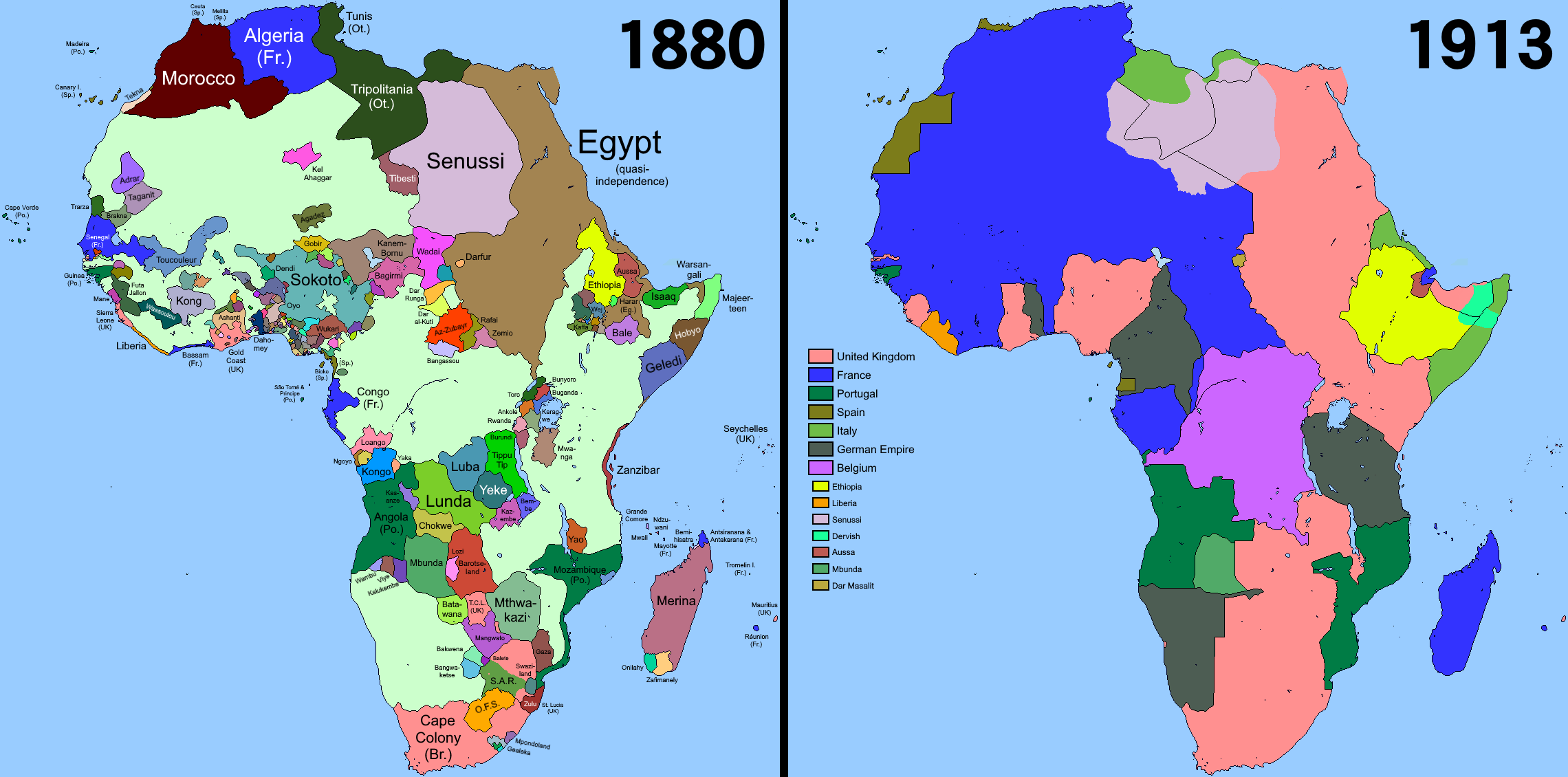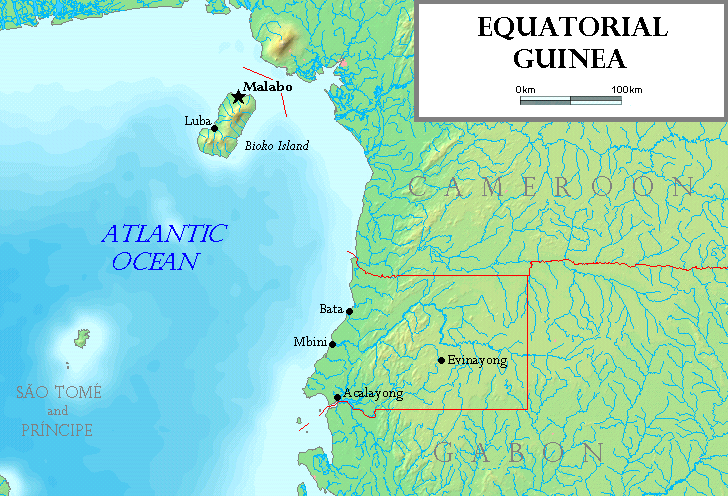|
1979 Equatorial Guinea Coup D'état
The 1979 Equatorial Guinea coup d'état happened on August 3, 1979, when President Francisco Macías Nguema's nephew, Teodoro Obiang Nguema Mbasogo, overthrew him in a bloody coup. Fighting between loyalists and rebels continued until Macías Nguema was captured fleeing for Cameroon on August 18. He was sentenced to death for the crime of genocide against the Bubi people and other crimes committed. Macías Nguema was executed by firing squad on September 29, 1979. Teodoro has remained leader since then, initially as chairman of the Revolutionary Military Council and Supreme Military Council and subsequently as president. Background After Francoist Spain granted Equatorial Guinea independence in 1968, a power struggle between Macías and Atanasio Ndongo Miyone led to the former assuming the presidency. Ndongo attempted a coup the following year; he was captured and executed, and the backlash to the presumed Spanish involvement in the coup led to a mass exodus of Spanish n ... [...More Info...] [...Related Items...] OR: [Wikipedia] [Google] [Baidu] |
Decolonisation Of Africa
The decolonisation of Africa was a series of political developments in Africa that spanned from the mid-1950s to 1975, during the Cold War. Colony, Colonial governments gave way to sovereign states in a process often marred by violence, political turmoil, widespread unrest, and organised revolts. Major events in the decolonisation of Africa included the Mau Mau rebellion, the Algerian War, the Congo Crisis, the Angolan War of Independence, the Zanzibar Revolution, and the events leading to the Nigerian Civil War. History The Scramble for Africa between 1870 and 1914 was a significant period of European imperialism in Africa that ended with almost all of Africa, and its natural resources, claimed as Colony, colonies by European powers, who raced to secure as much land as possible while avoiding conflict amongst themselves. The partition of Africa was confirmed at the Berlin Conference of 1885, without regard for the existing political and social structures. Almost all the pr ... [...More Info...] [...Related Items...] OR: [Wikipedia] [Google] [Baidu] |
Cuba
Cuba, officially the Republic of Cuba, is an island country, comprising the island of Cuba (largest island), Isla de la Juventud, and List of islands of Cuba, 4,195 islands, islets and cays surrounding the main island. It is located where the northern Caribbean Sea, Gulf of Mexico, and Atlantic Ocean meet. Cuba is located east of the Yucatán Peninsula (Mexico), south of both Florida and the Bahamas, west of Hispaniola (Haiti/Dominican Republic), and north of Jamaica and the Cayman Islands. Havana is the largest city and capital. Cuba is the List of countries and dependencies by population, third-most populous country in the Caribbean after Haiti and the Dominican Republic, with about 10 million inhabitants. It is the largest country in the Caribbean by area. The territory that is now Cuba was inhabited as early as the 4th millennium BC, with the Guanahatabey and Taino, Taíno peoples inhabiting the area at the time of Spanish colonization of the Americas, Spanish colonization ... [...More Info...] [...Related Items...] OR: [Wikipedia] [Google] [Baidu] |
1970s Coups D'état And Coup Attempts
Year 197 ( CXCVII) was a common year starting on Saturday of the Julian calendar. At the time, it was known as the Year of the Consulship of Magius and Rufinus (or, less frequently, year 950 ''Ab urbe condita''). The denomination 197 for this year has been used since the early medieval period, when the Anno Domini calendar era became the prevalent method in Europe for naming years. Events By place Roman Empire * February 19 – Battle of Lugdunum: Emperor Septimius Severus defeats the self-proclaimed emperor Clodius Albinus at Lugdunum (modern Lyon). Albinus commits suicide; legionaries sack the town. * Septimius Severus returns to Rome and has about 30 of Albinus's supporters in the Senate executed. After his victory he declares himself the adopted son of the late Marcus Aurelius. * Septimius Severus forms new naval units, manning all the triremes in Italy with heavily armed troops for war in the East. His soldiers embark on an artificial canal between the Tigris a ... [...More Info...] [...Related Items...] OR: [Wikipedia] [Google] [Baidu] |
Conflicts In 1979
Conflict may refer to: Social sciences * Conflict (process), the general pattern of groups dealing with disparate ideas * Conflict continuum from cooperation (low intensity), to contest, to higher intensity (violence and war) * Conflict of interest, involvement in multiple interests which could possibly corrupt the motivation or decision-making * Cultural conflict, a type of conflict that occurs when different cultural values and beliefs clash * Ethnic conflict, a conflict between two or more contending ethnic groups * Group conflict, conflict between groups * Intragroup conflict, conflict within groups * Organizational conflict, discord caused by opposition of needs, values, and interests between people working together * Role conflict, incompatible demands placed upon a person such that compliance with both would be difficult * Social conflict, the struggle for agency or power in something * Work–family conflict, incompatible demands between the work and family roles of ... [...More Info...] [...Related Items...] OR: [Wikipedia] [Google] [Baidu] |
Civil Wars Of The 20th Century
Civil may refer to: *Civility, orderly behavior and politeness *Civic virtue, the cultivation of habits important for the success of a society *Civil (journalism) ''The Colorado Sun'' is an online news outlet based in Denver, Colorado. It launched on September 10, 2018, to provide long-form, in-depth coverage of news from all around Colorado. It was started with two years of funding from blockchain ventu ..., a platform for independent journalism * Civil (surname) See also * {{Disambiguation ... [...More Info...] [...Related Items...] OR: [Wikipedia] [Google] [Baidu] |
Military Coups In Equatorial Guinea
A military, also known collectively as armed forces, is a heavily armed, highly organized force primarily intended for warfare. Militaries are typically authorized and maintained by a sovereign state, with their members identifiable by a distinct military uniform. They may consist of one or more military branches such as an army, navy, air force, space force, marines, or coast guard. The main task of a military is usually defined as defence of their state and its interests against external armed threats. In broad usage, the terms "armed forces" and "military" are often synonymous, although in technical usage a distinction is sometimes made in which a country's armed forces may include other paramilitary forces such as armed police. Beyond warfare, the military may be employed in additional sanctioned and non-sanctioned functions within the state, including internal security threats, crowd control, promotion of political agendas, emergency services and reconstruction, prot ... [...More Info...] [...Related Items...] OR: [Wikipedia] [Google] [Baidu] |
1979 In Equatorial Guinea
The following lists events that happened during 1979 in the Republic of Equatorial Guinea. Incumbents *President: Francisco Macías Nguema (till 3 August) *President: Teodoro Obiang Nguema Mbasogo (from 3 August) *Vice President: Bonifacio Nguema Esono Nchama (till 3 August) * First Vice President: Florencio Mayé Elá (from 3 August) * Second Vice President: Salvador Elá Nseng (from 3 August) Events *3 August – Dictator Francisco Macías Nguema of Equatorial Guinea was overthrown in a bloody coup d'état led by his nephew, Teodoro Obiang *18 August – Ousted dictator Francisco Macías Nguema is captured near his home village of Mongomo. * 23 August – The first ministerial cabinet of the Supreme Military Council was constituted, composed of eleven members: *29 September – Francisco Macías Nguema and six other defendants were convicted of genocide, embezzlement and treason, and were executed by a firing squad of soldiers from Morocco. *31 October – For the first ti ... [...More Info...] [...Related Items...] OR: [Wikipedia] [Google] [Baidu] |
2004 Equatorial Guinea Coup Attempt
The 2004 Equatorial Guinea coup d'état attempt, also known as the Wonga Coup, failed to replace President Teodoro Obiang Nguema Mbasogo with exiled opposition politician Severo Moto Nsá. Mercenaries organised by mainly British financiers were arrested in Zimbabwe on 7 March 2004 before they could carry out the plot. Prosecutors alleged that Moto was to be installed as the new president in return for preferential oil rights to corporations affiliated with those involved in the coup. The incident received international media attention after the reported involvement of Mark Thatcher, Sir Mark Thatcher in funding the coup, for which he was convicted and fined in South Africa. Summary On 7 March 2004 Zimbabwe Republic Police, Zimbabwean police in Harare International Airport, Harare airport impounded a plane which flew in from South Africa. The alleged plot leader, ex-Special Air Service (SAS) officer Simon Mann, was arrested with two colleagues near the runway while waiting for ar ... [...More Info...] [...Related Items...] OR: [Wikipedia] [Google] [Baidu] |
Central Intelligence Agency
The Central Intelligence Agency (CIA; ) is a civilian foreign intelligence service of the federal government of the United States tasked with advancing national security through collecting and analyzing intelligence from around the world and conducting covert operations. The agency is headquartered in the George Bush Center for Intelligence in Langley, Virginia, and is sometimes metonymously called "Langley". A major member of the United States Intelligence Community (IC), the CIA has reported to the director of national intelligence since 2004, and is focused on providing intelligence for the president and the Cabinet. The CIA is headed by a director and is divided into various directorates, including a Directorate of Analysis and Directorate of Operations. Unlike the Federal Bureau of Investigation (FBI), the CIA has no law enforcement function and focuses on intelligence gathering overseas, with only limited domestic intelligence collection. The CIA is responsibl ... [...More Info...] [...Related Items...] OR: [Wikipedia] [Google] [Baidu] |
The World Factbook
''The World Factbook'', also known as the ''CIA World Factbook'', is a Reference work, reference resource produced by the United States' Central Intelligence Agency (CIA) with almanac-style information about the countries of the world. The official print version is available from the Government Publishing Office. The ''Factbook'' is available in website and downloadable formats. It provides a two- to three-page summary of the demography, demographics, geography, communications, government, economy, and military of 266 international entities, including List of countries by date of recognition of the United States, U.S.-recognized countries, dependencies, and other areas in the world. ''The World Factbook'' is prepared by the CIA for the use of Federal government of the United States, U.S. government officials, and its style, format, coverage, and content are primarily designed to meet their requirements. It is also frequently used as a resource for academic research papers and n ... [...More Info...] [...Related Items...] OR: [Wikipedia] [Google] [Baidu] |
Florencio Mayé Elá
Florencio Mayé Elá Mangue (born 1944) is an Equatorial Guinean, Equatoguinean military leader, politician, and diplomat. Biography In the 1960s, Mayé had military training at the General Military Academy in Zaragoza, Spain, along with Teodoro Obiang Nguema Mbasogo, Teodoro Obiang, Eulogio Oyó, and other future leaders. Under the dictatorship of Francisco Macías Nguema, Francisco Macías, Mayé was head of the Navy of Equatorial Guinea, National Navy. He participated in the 1979 Equatorial Guinea coup d'état, coup of 3 August 1979, and in the subsequent government of the Supreme Military Council (Equatorial Guinea), Supreme Military Council as Vice President of Equatorial Guinea, Vice President and Ministry of Foreign Affairs and International Cooperation (Equatorial Guinea), Minister of Foreign Affairs, participating in the signing of the Treaty of Friendship and Cooperation between Spain and Equatorial Guinea of 1980. He was decorated in Spain with the Order of Isabella t ... [...More Info...] [...Related Items...] OR: [Wikipedia] [Google] [Baidu] |


